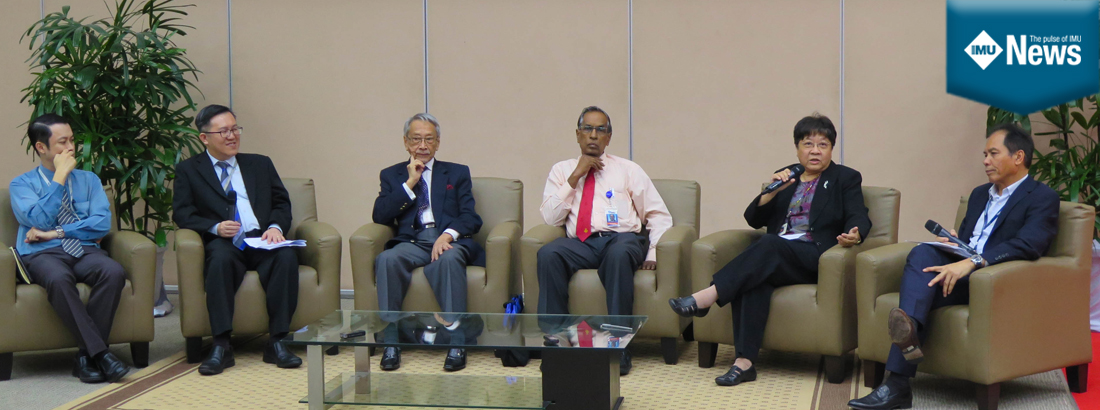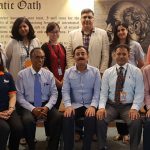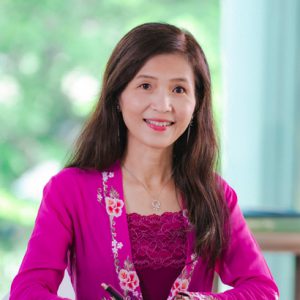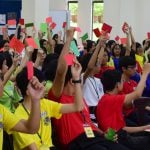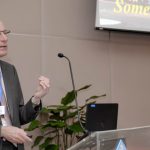What will the work of faculty be like in the coming 20 to 30 years? Over the last decade, the higher education system has undergone tremendous transformation to serve the large and diverse public. New institutional types and approaches to education have emerged leading to the formation of a non-homogenous faculty group today. Some institutions have developed new models of faculty work and taken positive efforts to expand faculty work such as teaching, research, community engagement and service. Two studies were conducted in 2016 to examine the roles of the professoriate and scholarship, as part of the chapters in the upcoming International Medical University (IMU) 25th Anniversary Book. The primary aim of the book is to chart the future directions of IMU. In conjunction with the book project, a seminar on “The Roles of the Professoriate and Scholarship in the Community” was held in IMU Bukit Jalil campus on 7 July 2017.
The authors, Prof Chu Wan Loy and A/Prof Tan Eng Lai presented the highlights of the two chapters in this seminar. Prof Chu presented the chapter on “Academia and Scholarship at the IMU” while A/Prof Tan highlighted the chapter on “Roles of the Professor in the Past, Present and in the Future”. This was followed by presentations from external reviewers of the book chapters.
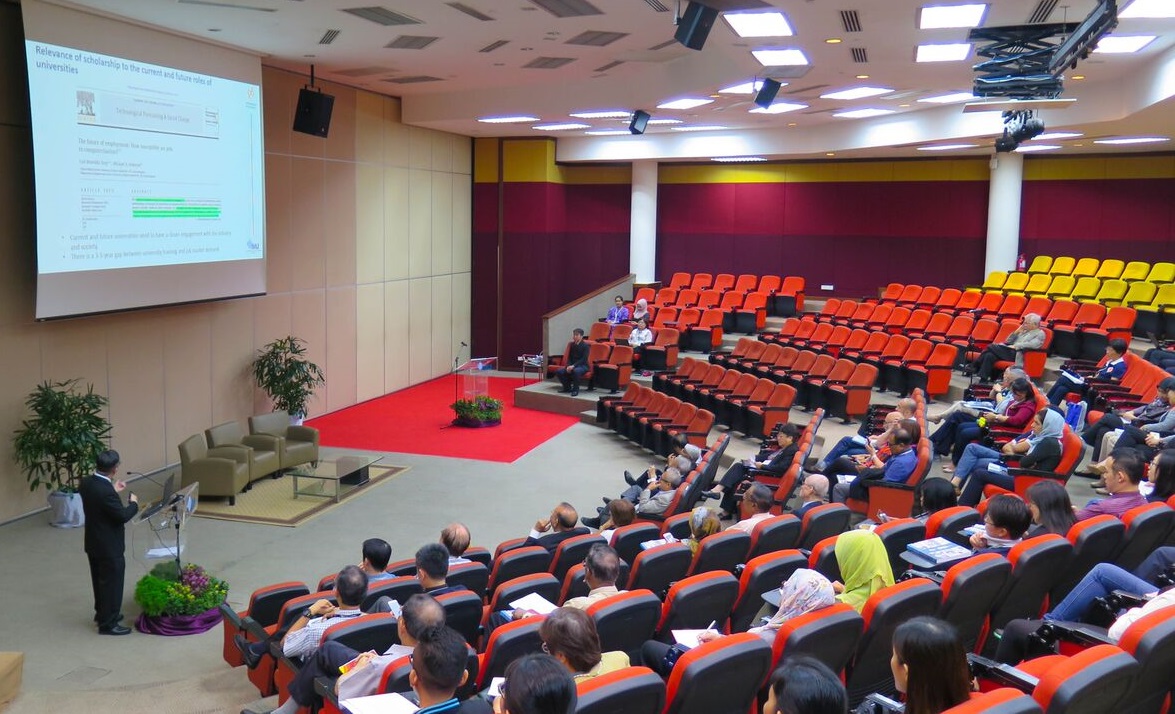 The reviewers of the book chapter on scholarship were Prof Datuk Dr Asma Ismail from Universiti Sains Malaysia (USM), Prof Dato’ Dr Ahmad Ibrahim from the Academy of Sciences Malaysia (ASM), and Prof Dr Jamuna Vadivelu from Universiti Malaya (UM). For the chapter on professoriate, the reviewers were Emeritus Prof Academician Tan Sri Datuk Dr Omar Abdul Rahman, Founding and Senior Fellow and First President of ASM, Prof Datuk Dr Looi Lai Meng from UM, and Prof Dato’ Dr Ahmad Ibrahim (ASM).
The reviewers of the book chapter on scholarship were Prof Datuk Dr Asma Ismail from Universiti Sains Malaysia (USM), Prof Dato’ Dr Ahmad Ibrahim from the Academy of Sciences Malaysia (ASM), and Prof Dr Jamuna Vadivelu from Universiti Malaya (UM). For the chapter on professoriate, the reviewers were Emeritus Prof Academician Tan Sri Datuk Dr Omar Abdul Rahman, Founding and Senior Fellow and First President of ASM, Prof Datuk Dr Looi Lai Meng from UM, and Prof Dato’ Dr Ahmad Ibrahim (ASM).
In addition to this, there was a forum moderated by the Vice-Chancellor of IMU, Prof Abdul Aziz Baba to further deliberate on the topics after the presentations.
Professoriate is a group of academic professors collectively who have officially gained their academic qualifications and professorship and is working in a legitimate university or college. On the other hand, scholarship can be defined as the scope of academic works engaged by the professoriate beyond teaching which includes engaging in original research, bridging the gap between knowledge and practice, as well as communicating the knowledge effectively to the students. 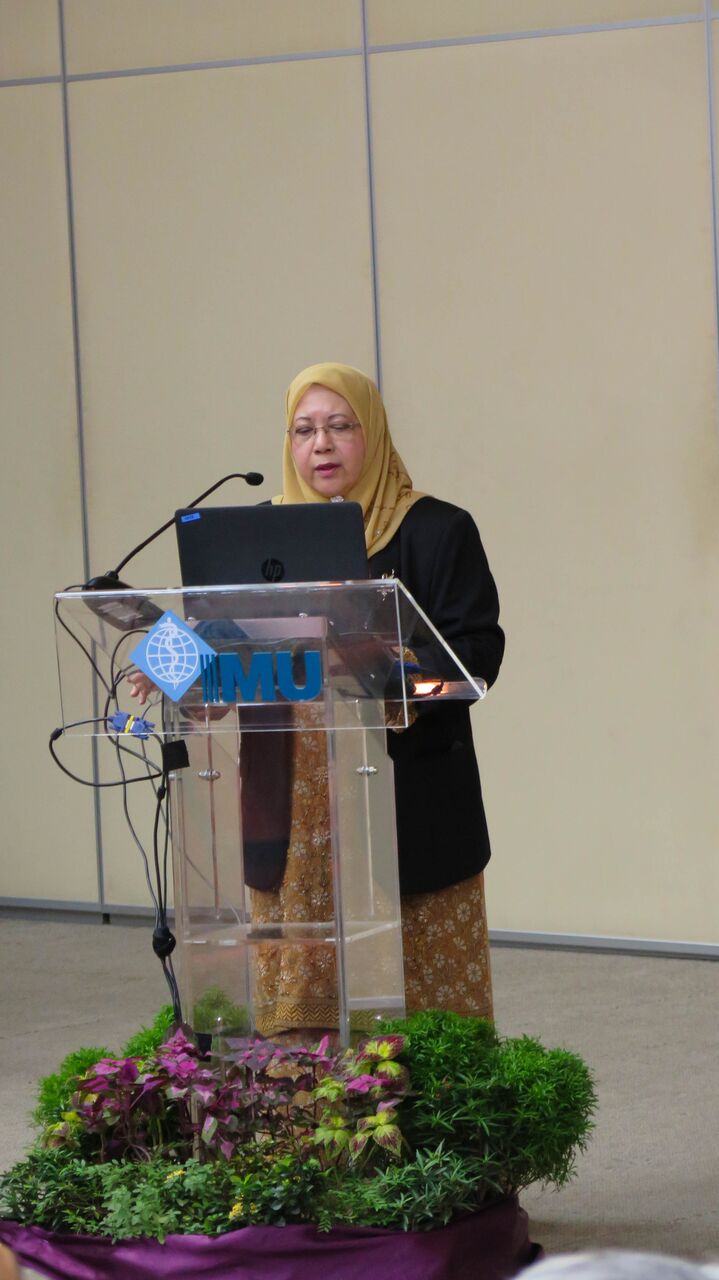 Ernest Boyer, in his well-known 1990 report on “Scholarship reconsidered: Priorities for the professoriate”, remarked that the work of the professoriate might be thought of having four separate, yet overlapping functions. These are the scholarship of discovery, scholarship of integration, scholarship of application, and scholarship of teaching. Scholarship of discovery is to build new knowledge through traditional research contributing to the intellectual climate of a university. Scholarship of integration is dealing with making connections and interpreting the use of knowledge across disciplines to be integrated into a larger body of knowledge. Scholarship of application is utilising research findings and innovations to solve problems of society including service activities related field of knowledge and professional activities. Last but not least, scholarship of teaching, which is the central element of scholarship, is to study teaching models and practices to achieve optimal learning. The IMU Learning Model emphasises on the integration of the different forms of scholarships, particularly in relation to all teaching and learning activities. In addition to its primary roles as an educational centre, IMU has implemented the scholarship of integration by establishing healthcare services in different medical disciplines, offering an integration of Western, traditional and complementary medicine. Both students and faculty participate in community service projects, which clearly demonstrate the practice of the scholarship of application.
Ernest Boyer, in his well-known 1990 report on “Scholarship reconsidered: Priorities for the professoriate”, remarked that the work of the professoriate might be thought of having four separate, yet overlapping functions. These are the scholarship of discovery, scholarship of integration, scholarship of application, and scholarship of teaching. Scholarship of discovery is to build new knowledge through traditional research contributing to the intellectual climate of a university. Scholarship of integration is dealing with making connections and interpreting the use of knowledge across disciplines to be integrated into a larger body of knowledge. Scholarship of application is utilising research findings and innovations to solve problems of society including service activities related field of knowledge and professional activities. Last but not least, scholarship of teaching, which is the central element of scholarship, is to study teaching models and practices to achieve optimal learning. The IMU Learning Model emphasises on the integration of the different forms of scholarships, particularly in relation to all teaching and learning activities. In addition to its primary roles as an educational centre, IMU has implemented the scholarship of integration by establishing healthcare services in different medical disciplines, offering an integration of Western, traditional and complementary medicine. Both students and faculty participate in community service projects, which clearly demonstrate the practice of the scholarship of application.  The setting up of the IMU Institute for Research, Development, and Innovation (IRDI) has put in place the mechanism for scholarly discovery and learning, as it provides the leadership and direction in such scholarly activities. In facilitating scholarship of discovery through research, IMU has been providing internal support for physical infrastructure development, equipment, research management and training. Besides, IMU aspires to be a learning organisation that greatly emphasises on the attributes of critical thinking and lifelong learning in the nurturing of future scholars.
The setting up of the IMU Institute for Research, Development, and Innovation (IRDI) has put in place the mechanism for scholarly discovery and learning, as it provides the leadership and direction in such scholarly activities. In facilitating scholarship of discovery through research, IMU has been providing internal support for physical infrastructure development, equipment, research management and training. Besides, IMU aspires to be a learning organisation that greatly emphasises on the attributes of critical thinking and lifelong learning in the nurturing of future scholars. 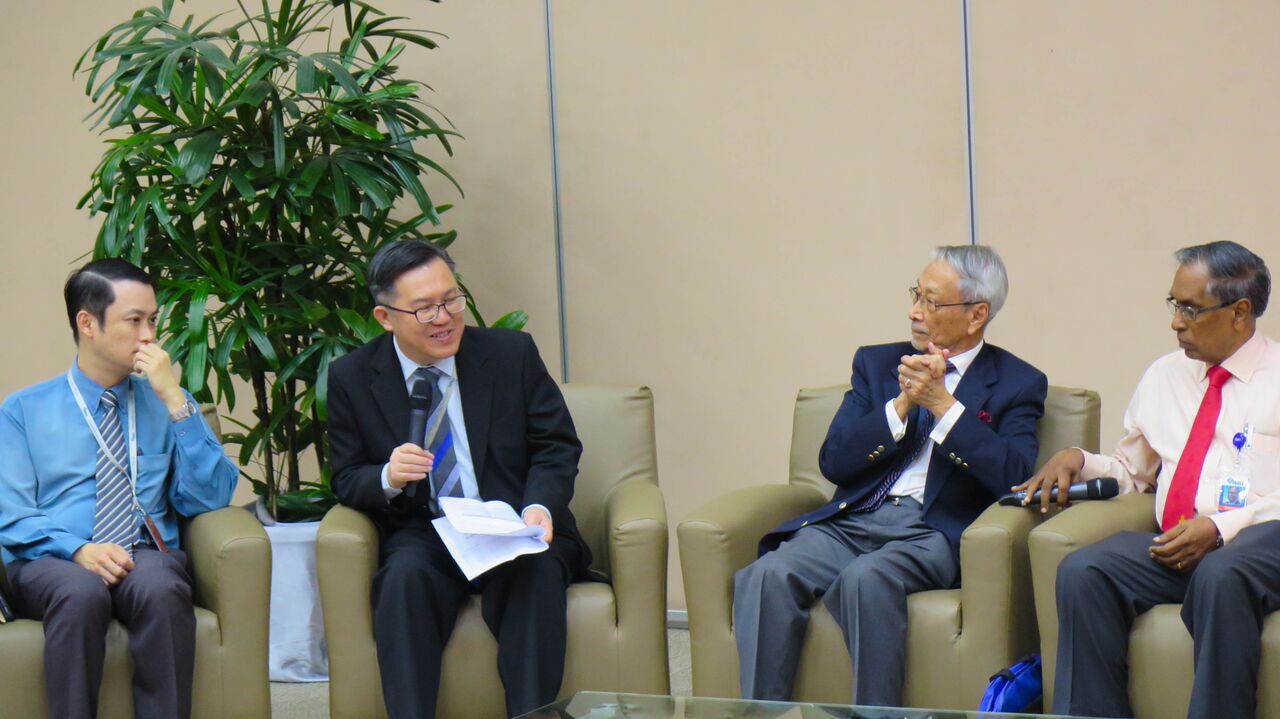 In IMU, professionalism and ethics are emphasised in the nurturing of future scholars, as skills and behaviors are integral to the scholars’ characteristics. Various assessment systems are in place to evaluate the performance of scholarly activities amongst IMU staff. For instance, staff performance appraisal and promotion take into consideration of staff achievements in different forms of scholarships. On top of all, mentoring has been identified as a crucial element in nurturing scholarship.
In IMU, professionalism and ethics are emphasised in the nurturing of future scholars, as skills and behaviors are integral to the scholars’ characteristics. Various assessment systems are in place to evaluate the performance of scholarly activities amongst IMU staff. For instance, staff performance appraisal and promotion take into consideration of staff achievements in different forms of scholarships. On top of all, mentoring has been identified as a crucial element in nurturing scholarship.  It has also been suggested to add another dimension which is digital scholarship to the original Boyer’s model. Digital scholarship is about the use of Information, Communications, and Technology (ICT), methods of inquiry, research, lifelong learning, and collaboration. This is especially relevant in the context of digital world and the industry 4.0. Impact of digital technology and ICT is not only confined to the scholarship of teaching but also all the four dimensions of scholarship. Technology advancements have somehow impacted on the practice and facilitation of scholarship and nurturing of future scholars. In this seminar, the findings of a survey on scholarship done by IMU among educators, health practitioners, corporate members, and students were also highlighted. In the survey, most respondents stated that artificial intelligence can never replace scholars and the same goes to computer simulation can never replace apprenticeship. However, the respondents agreed that development of future scholars should not be confined to the classroom. Also, there was consensus that the four dimensions of Boyer’s scholarship are still relevant and it is crucial for universities to train the students to be able to adjust and adapt to changes.
It has also been suggested to add another dimension which is digital scholarship to the original Boyer’s model. Digital scholarship is about the use of Information, Communications, and Technology (ICT), methods of inquiry, research, lifelong learning, and collaboration. This is especially relevant in the context of digital world and the industry 4.0. Impact of digital technology and ICT is not only confined to the scholarship of teaching but also all the four dimensions of scholarship. Technology advancements have somehow impacted on the practice and facilitation of scholarship and nurturing of future scholars. In this seminar, the findings of a survey on scholarship done by IMU among educators, health practitioners, corporate members, and students were also highlighted. In the survey, most respondents stated that artificial intelligence can never replace scholars and the same goes to computer simulation can never replace apprenticeship. However, the respondents agreed that development of future scholars should not be confined to the classroom. Also, there was consensus that the four dimensions of Boyer’s scholarship are still relevant and it is crucial for universities to train the students to be able to adjust and adapt to changes. 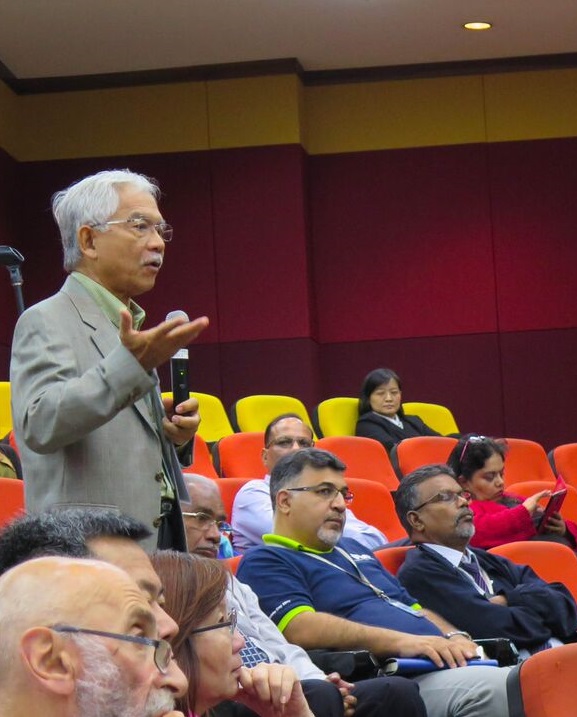 The role of professoriate has been evolving in the 21st century. Gone are the days when professors lectured large classes and students carefully listened to them while taking notes in their notebook. The same goes to the roles and expectations of universities. Aside from the main role of generating and disseminating knowledge, universities are also expected to translate knowledge through innovations and entrepreneurships. Universities also play a role in training innovators of tomorrow with curriculum that creates graduates that are self-employed and entrepreneurs that participate in startups. In addition, universities are engines of growth for the nation via commercialisation of research and development products and development of K-based enterprises. In line with the fast and rapidly constant changing roles of university faculty, professors and universities must reconsider and define their roles and priorities in the academic world. Universities need to make adjustments and adaptations to keep pace with the rapid changes in the practice and facilitation of scholarship and training of future scholars. Not forgetting that the quality of academics and mentoring should also be emphasised. At the end of the day, the issue is not the number of new faculty, but the quality of their training that matters the most.
The role of professoriate has been evolving in the 21st century. Gone are the days when professors lectured large classes and students carefully listened to them while taking notes in their notebook. The same goes to the roles and expectations of universities. Aside from the main role of generating and disseminating knowledge, universities are also expected to translate knowledge through innovations and entrepreneurships. Universities also play a role in training innovators of tomorrow with curriculum that creates graduates that are self-employed and entrepreneurs that participate in startups. In addition, universities are engines of growth for the nation via commercialisation of research and development products and development of K-based enterprises. In line with the fast and rapidly constant changing roles of university faculty, professors and universities must reconsider and define their roles and priorities in the academic world. Universities need to make adjustments and adaptations to keep pace with the rapid changes in the practice and facilitation of scholarship and training of future scholars. Not forgetting that the quality of academics and mentoring should also be emphasised. At the end of the day, the issue is not the number of new faculty, but the quality of their training that matters the most.
Overall, this seminar has been very fruitful as the discussions on scholarship and professoriate were intellectually stimulating. The topics deliberated are not only pertinent to IMU but also to the country.




